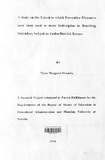| dc.description.abstract | Failure by administration to follow the set guidelines on students discipline in
most schools, has been cited as the root cause of unrests and indiscipline in several schools in Kenya. This study was an attempt at establishing the extent to which various measures to control indiscipline were practiced in boarding secondary schools in Embu District. It considered key areas such as Guidance and Counseling; students participation in making decisions in schools and school community relations.
The study sought to answer seven research questions and among them are: to what extent are student consulted while making school rules and other decision
regarding them in schools; what role does the community play in relation to solving students indiscipline in secondary schools and the extent of stakeholders involvement in matters of discipline.
The study was deemed to be significant to the following groups: Headteachers of secondary schools, teachers, educational policy makers, parents, teacher training colleges and universities. It assumed that good discipline cannot thrive without the active participation of the entire school community.
The conceptual framework was based on the linkages between guidance and counseling, school-community relationship and democratic leadership in maintaining discipline in schools thus achieving the set aims, goals and aspirations of the school.
The study was designed as a survey research design. The target population was composed of students, teachers and headteachers in boarding secondary schools of Embu District. Three questionnaires were used. The reliability coefficients for research instruments were computed using, the Spearman Brown Prophesy
formula and the reliability obtained was 0.79. This computational reliability indicated that the instruments were reliable. The data collected was analyzed with the use of Statistical Package for Social Sciences (SPSS) computer programme. Frequencies, percentages and tables were used.
The following were the main findings of the study.
1. Common disciplinary problems in boarding secondary schools in Embu were stealing, disobedience to teachers and fighting among students.
2. Guidance and Counseling was the most used preventive measure to manage students' discipline.
3. Students participation in decision making was quite minimal hence more needs to be done to enable students practice their democratic skills.
Based on the findings of the study, the following conclusions were made and the key ones are: teachers in boarding secondary schools experienced numerous discipline problems with stealing, fighting and disobedience to teachers as the leading. Some forms of indiscipline like theft may not be eliminated by punishment or suspension as some students even get away without being noticed. Schools should therefore set up committees among the prefects body and act as investigators to uncover such things teachers alone cannot manage.
Though headteachers realized the importance of involving all stakeholders such as parents, B.O.G, teachers and students in policy formulation in schools, the involvement was quite minimal and all stakeholders need to recognize the importance of their involvement and thus would help in success of the school.
The degree of students' participation in decision making was not as desired and needed to be greatly improved. This is to because involving students in decisions making gives them a chance to practice their democratic skills thus creating a sense of responsibility.
The study recommended that, to ensure all stakeholders involvement in policy making and maintaining discipline in schools, they need to be educated and sensitized on their roles and this can be done in schools by inviting guest speakers
to talk to parents, sponsors, students among others or by chiefs in Barazas or even through the mass media.
Close monitoring by the inspectorate should be done to ensure that the set guidelines on managing discipline in schools are implemented accordingly.
From the findings and conclusions of the study there is need for a further research on the perceptions of parents, sponsors and the community at large on the measures of preventing indiscipline. | en |

